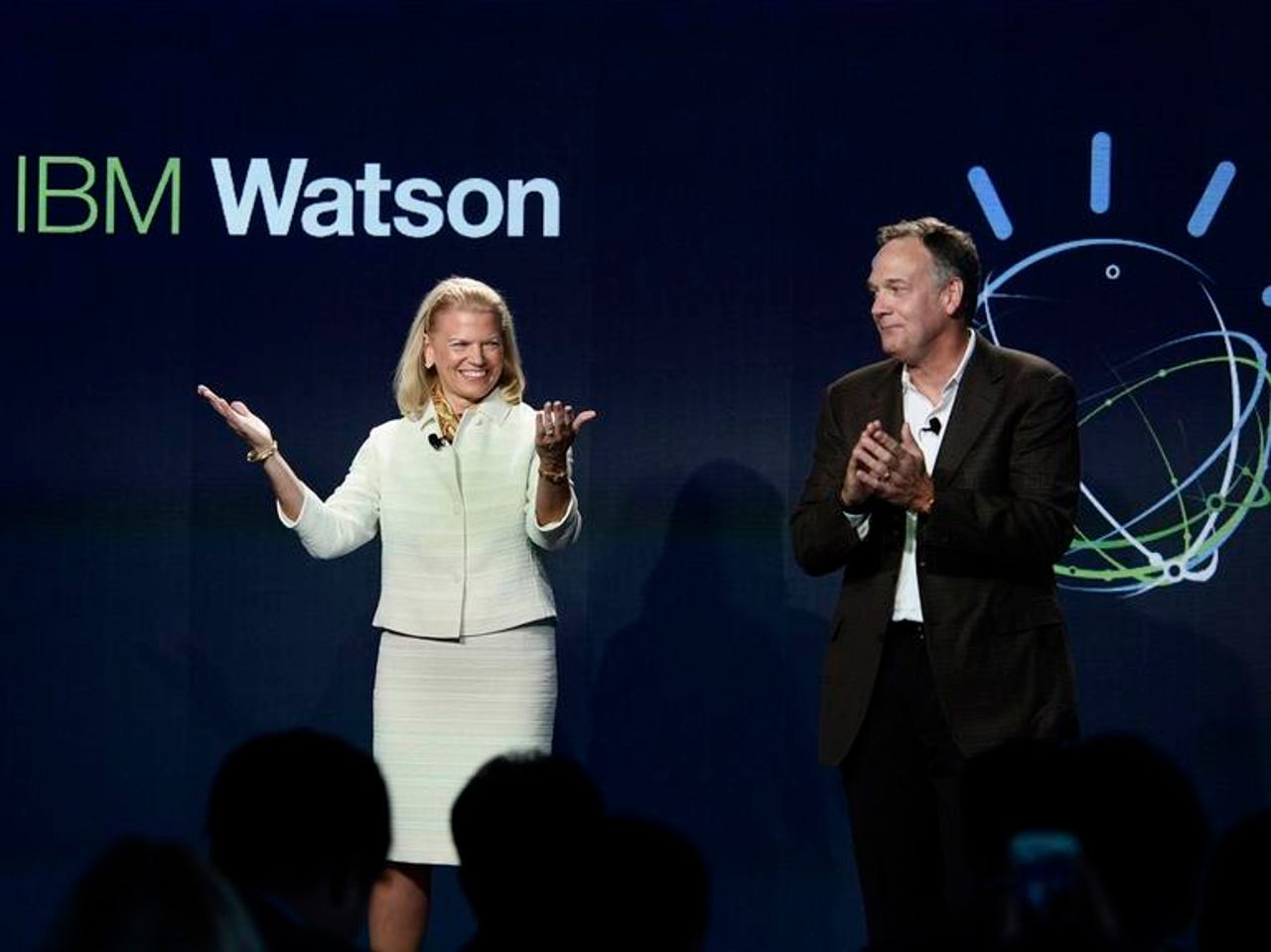Should IBM be your AI and machine learning platform?


IBM CEO Ginni Rometty and IBM Watson Group Senior VP Mike Rhodin.
Of all the tech giants throwing their weight behind artificial intelligence (AI) and machine learning, few receive the kind of attention garnered by IBM. After its seminal Jeopardy win in 2011, IBM Watson became synonymous with technologies such as cognitive computing and AI.
Upon losing to Watson, former Jeopardy champion Ken Jennings famously wrote "I, for one, welcome our new computer overlords" under one of his responses. All of a sudden, Watson was a household name, igniting conversations about what could be accomplished with AI.
SEE: IBM Watson: The smart person's guide (TechRepublic)
While Watson is a major part of IBM's approach to AI solutions, it's only a piece of the puzzle. Here's a deeper look at the bigger picture, so businesses can determine if IBM is the right AI vendor for their needs.
The history
IBM Research, the company's research division, dates back to 1945, when it opened the Watson Scientific Computing Laboratory at Columbia University. IBM's work in AI began in the 1950s, according to its website. Around that time, an IBM employee named Arthur Samuel wrote a self-learning program for playing checkers, and would later be recognized as a pioneer in AI and machine learning.
In the 1970s, IBM built its first robot, and advanced its work in the field in the 1980s with the IBM RS 1. In the 1990s, IBM Researcher Gerry Tesauro used reinforcement learning (RL) to create a self-learning game of backgammon. Then, in 1997, IBM's Deep Blue computer famously beat World Chess Champion Garry Kasparov at chess.
The company's development of actual AI products began more recently. Mike Gualtieri, of Forrester Research, said that IBM's journey toward AI solutions began in 2009, when it acquired two companies: ILOG and SPSS. ILOG is a business rules engine, Gualtieri said, which used to be called an expert system, while SPSS provides advanced analytics. Both of these purchases helped jumpstart IBM's work on AI solutions for businesses.
Today, IBM's AI initiatives are centered around the Watson platform. IBM has Watson solutions for analytics and machine learning, data search and discovery, and conversation tools like chat bots.
The vision
IBM views AI as "augmented intelligence," said Guru Banavar, vice president and chief science officer for cognitive computing at IBM Research. To take that concept a little further, 451 Research analyst Nick Patience explained augmented intelligence as "AI -- and machine learning in particular -- acting as a force multiplier for humans."
Currently, Banavar said, there are "thousands" of engineers working on the Watson platform. On a high level, the team is split into two very distinctive camps. One on end of the spectrum is a group working on "very concrete, commercial development and deployment," which happens usually on a weekly, monthly, or quarterly basis.
"Then, at the other end of the spectrum, we have teams of people that are working on advanced new technologies -- some of which are being invented -- all the way up to mathematicians who are developing the underlying techniques for them," Banavar said.
After Watson won Jeopardy, Banavar said the team at IBM was focused on building custom systems for specific clients or industry niches. However, they recently had to make a conscious strategic decision to move away from that model to focus on APIs.
Banavar said that IBM realized it wouldn't be possible to build out all of the applications they wanted to with their existing strategy. So, they turned some of their capabilities into a platform with open APIs, "in order to attract and nurture a larger ecosystem of developers that can build many applications that IBM cannot build by ourselves," Banavar said.
Those APIs are being put to use in areas like retail, finance, law, and even fantasy football. But healthcare is one of the primary focuses for Watson solutions.
"I could see a vision where every hospital, every clinical group, had this Watson service. It becomes as essential as an X-ray, as essential as an MRI," Gualtieri said. "So, I think that's their vision. They're putting a lot against that."
Strengths
To understand whether or not IBM would be a good fit for your organization, you must weigh your company's needs against IBM's strengths. On the technical side of things, Banavar said, these strengths start with Watson's language capabilities.
"Watson has image processing capabilities, speech processing capabilities, regular numerical data analytics capabilities across the board -- we have the entire spectrum," Banavar said. "But, if you ask me what is a really unique, and probably the most advanced, capability in Watson, it is language processing."
When it comes to business, IBM's AI strength comes from three key elements: IBM Research, its acquisition prowess, and its consultants.
IBM Research may not always produce a breakthrough, but it does give the company a distinctive edge, said Gualtieri. "The advantage of that is that the largest companies in the world -- who IBM wants to sell to -- want that edge," he added.
SEE: IT leader's guide to the future of artificial intelligence (Tech Pro Research)
The ability to acquire the right companies to broaden its portfolio of offerings is a key differentiator for IBM. Banavar noted that the company has also been leveraging open-source libraries and toolkits to make use of new techniques in neural networking, word embedding, and more.
In addition to its research prowess and acquisition budget, IBM has a large network of consultants. According to Patience, that is key, "because a lot of the early machine learning opportunities involve taking enabling technologies such as machine learning algorithms and turning them into enhanced business processes and applications; something IBM understands well."
Challenges
One of the biggest challenges facing IBM is managing the expectations that come from terms like cognitive computing and AI. This is further compounded by the public-facing nature of Watson, especially in the wake of its Jeopardy win, and confusion around the capabilities of AI as well.
"Everyone thinks that we're on the verge of Star Trek, like next week," Gualtieri said. So, IBM must have a grand and transformative vision about the future of AI, but they also have to keep the expectations in check so customers don't regret moving forward, Gualtieri noted.
On the question of safety and ethics, many would share Gualtieri's view that the technology "is not even close to getting to the point where ethical issues are really a serious concern." However, Banavar said that ethical challenges are still something the IBM team must consider.
The first crucial issue that must be addressed, Banavar said, is the idea of explainability. If a doctor or financial advisor uses Watson to make a decision, for example, they must be able to understand why Watson chose a particular solution or set of options.
The other ethical consideration is bias. With machine learning systems, the models are built with training data -- but the data has to faithfully represent what you're trying to model, or it could be biased, Banavar said. Because of that, selecting the proper training data set is an ethical decision of the utmost importance. This is made even more important by how broad a potential impact Banavar sees for AI technologies.
"At the end of the day, I do think that cognitive computing is necessary for us to solve the world's big problems," Banavar said.
Also see
- IBM Watson is coming to the iPhone, and that's big news for business users (TechRepublic)
- IBM Watson: What are companies using it for? (ZDNet)
- IBM Watson takes on cybercrime with new cloud-based cybersecurity technology (TechRepublic)
- IBM Watson-powered app aims to make hospital visits less daunting for young patients (ZDNet)
- IBM Watson machine learns the art of writing a good headline (TechRepublic)